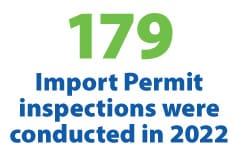About Us
The CDC Import Permit Program, or IPP, regulates the importation of infectious biological materials that could cause disease in humans in order to prevent their introduction and spread into the U.S. The program ensures that the importation of these agents is monitored and that facilities receiving permits have appropriate biosafety measures in place to work with the imported agents.
- Infectious biological agents capable of causing illness in humans
- Materials known or reasonably expected to contain an infectious biological agent
- Vectors of human disease (such as insects or bats)
These items may be imported into the U.S. for a variety of reasons, including:
- Outbreak surveillance
- Research and development of diagnostics, vaccines, and therapeutics
- To benefit from unique laboratory testing available in the U.S.
- To support research to better understand the potential threats posed by these agents
Regulatory authority for the program is given to the Secretary of Health and Human Services through the Public Health Service Act, which allows for the development and enforcement of regulations to prevent the introduction, transmission, or spread of communicable disease from foreign countries into and throughout the U.S. or its possessions. The regulations require that anyone wishing to import infectious biological agents, infectious substances, or vectors must first obtain a permit issued by CDC.
Most permits are issued to laboratory facilities at government agencies and universities, or to private and commercial laboratories conducting research studies or diagnostic activities. In recent years, approximately 3,000 import permits have been issued by the program annually, with a total of 3,005 issued in 2022.

Key Regulatory Functions and Activities
- Issues permits. Entities requesting to import biological materials into the country apply for a permit from CDC. Import permit applications must be submitted via the electronic Import Permit Program system, eIPP. An e-tool is available to help potential applicants determine if an import permit is needed. Currently, there is no fee for processing a CDC import permit.
- Conducts inspections. An inspection may be conducted before a permit is issued, in order to ensure the applicant’s facility has appropriate measures in place to minimize the accidental release of biological agents capable of causing human disease. Inspections evaluate the applicant’s biosafety measures (e.g., physical structure, operational and procedural safeguards). Applicants may be informed of inspections ahead of time, or they may be unannounced.
- Provides outreach and training. IPP provides guidance and support to assist the regulated community in meeting the requirements of the import permit regulations. Training is provided through workshops intended to inform individuals of their responsibilities for complying with the regulations.
- Collaborates with partners. IPP partners with other federal agencies to ensure the safe handling and use of imported infectious biological agents. In addition, during times of public health emergencies (including outbreaks), the program ensures timely approval for importation of critical diagnostic samples and vaccine strains. Key partners include:
- CDC’s Division of Global Migration Health, which is charged with preventing the introduction, transmission, and spread of communicable diseases into the U.S.
- U.S. Customs and Border Protection, which secures the nation’s borders from terrorists and other threats and facilitates legitimate trade and travel
- USDA’s Animal and Plant Health Inspection Service, which regulates infectious agents of livestock and biological materials containing animal materials
- Department of Transportation, which regulates the shipment of infectious substances in commercial transportation